Warhammer 40,000: Rogue Trader is Warhammer Mass Effect, and you can own planets
Plus, visit Commorragh for the first time in a game
In the grim darkness of the far future, the galaxy is your oyster. Or at least it will be, once you've played 100 hours of
Warhammer 40,000: Rogue Trader, an
RPG from
Pathfinder developer Owlcat in which you can buy planets, configure your genocidal Dark Eldar friend to strike ten times a turn, and gaze on ruefully as a demon explodes out of your Psyker's head.
An immediate and shameful disclaimer: I can't match Nic Reuben's deep knowledge of the 40K tabletop universe, which saw him
ruminating upon the mysteries of the Koronus Expanse back in 2022, while holding Owlcat's feet to the fire over the absence of space dwarves. The nearest I got to playing 40K as a lad was its Battlefleet Gothic spin-off (which none of my friends were interested in, so when I say "playing", I mean that I sat in a room staring glumly at some unpainted Lunar-class Cruisers while other kids went out and climbed trees). The framing I'm working with instead, based on an hour of hands-off Rogue Trader gameplay, is that it's sort of Warhammer Mass Effect, but with XCOM-style turn- and grid-based combat, and while there are opportunities to be a compassionate hero, you fundamentally only have the option of playing Renegade. Let's dig in!
First, a quick recap on what a "Rogue Trader" is. "They're essentially pirates that explore the fringes of the galaxy to bring new worlds into the Imperium," creative director Alexander Mishulin told me before our demo. Unusually for subjects of 40K's undead God-Emperor, rogue traders can amass enormous independent wealth and operate their own starfleets and planetary colonies, without getting slapped down by the Inquisition. Part of the thrill of playing one is going gently mad with power, but that unbridled autonomy is also essential for a plot-branching CRPG in the Pathfinder vein. "The Imperium is a very strict and tyrannical society," Mishulin went on. "So to make an RPG that has all these choices and consequences, we had to find somebody in this society who can make those choices and not just get shot."
Your goal in the game as a custom-created Rogue Trader is to restore the trading empire of your predecessor Teodora, who has met a mysterious fate. Character creation sees you picking through a pleasing abundance of stats, including Carouse and Commerce and three flavours of Lore, while also choosing a Triumph and Darkest Hour to form your backstory. These latter choices have both minor mechanical impacts and larger narrative consequences. "Other characters might know about your greatest triumph or your greatest failure and deal with you accordingly," said Mishulin.
Having crafted a budding Roger de Flor, you'll sally forth to recruit your very own Warhammer 40K Catalan Company. Rogue Trader features ten storied companions, of whom you can take six (including your protagonist) into battle. They hail from different races or factions, and are defined by three broad philosophical alignments which may lead to disagreements and even desertion. Imperalis represents devotion to the Imperium, hatred of xenos and a love of order generally. Hereticus is for evil Chaos-worshipping, alien-loving hipsters. And Benevolentia represents "faith in the power of goodwill, capable of overcoming the horrors and dangers of the universe without the need for artificial prohibitions", to quote the game's menus. As I said, I'm not your guy for 40K lore dissection, but I feel like Benevolent characters are going to have a harder time navigating this setting.
Mishulin showed me a party of his own creation, representing the fruits of about 80 hours of play. By the sounds of it, one of the first characters you'll meet is Abelard, your right hand man and mentor. Mishulin's version of Abelard was a hard-wearing Seneschal, never happier than when taking Bolter rounds for the team. Mishulin demonstrated this in a demo battle by running Abelard right into the sights of a Necron Immortal equipped with a monstrous chain-hit lightning gun, while shuffling the rest of the party into cover to avoid stray bolts. We're right behind you, champ!
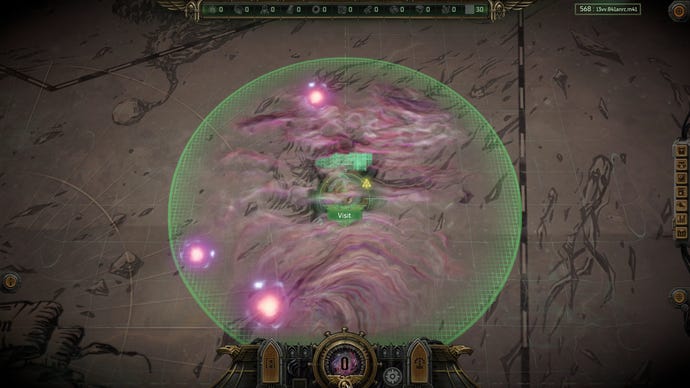
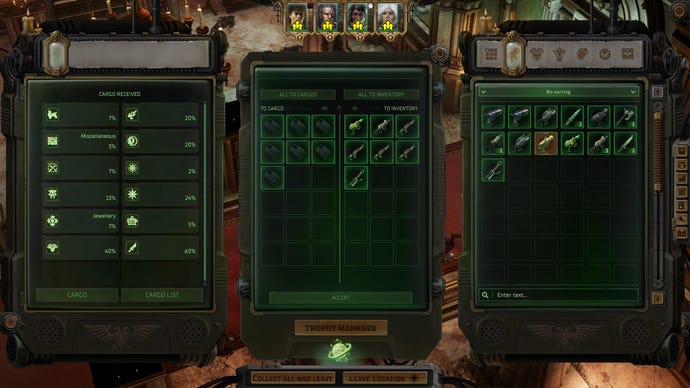
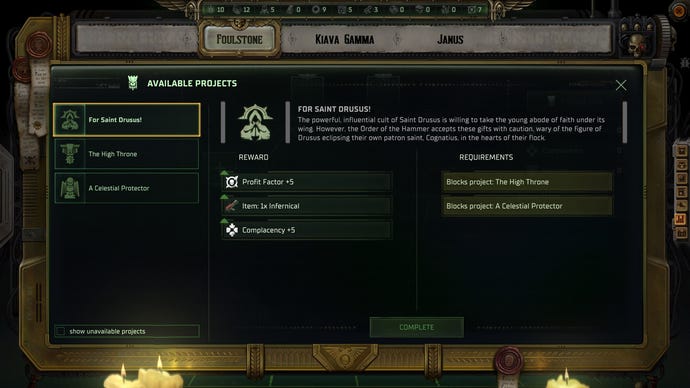
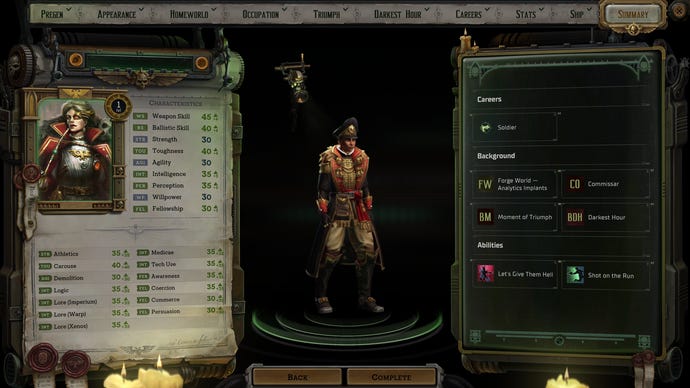
Image credit: Owlcat
If Abelard will always have your back - providing you don't turn to heresy, anyway - the same may not be true of Idira. She's an unsanctioned psyker, aka illegal magic user, and an old friend of Teodora. Her dalliance with the terrible energies of the Warp means that she's all but guaranteed to meet a grisly demise, possibly taking out anybody nearby in the process. "She could mutate, or her head could explode and a demon could emerge out of that," said Mishulin. Idira's key skill is divination, which allows her to buff allies in combat by predicting good futures. She can also tell the future at the level of the narrative, which sounds like a fascinating dynamic in a game that prides itself on setting up plot dominoes all the way to the epilogue.
Pasqal is the group's machine-worshipping tech-priest. He's a versatile fighter, capable of melee and ranged damage, and something of a strategist. In the demo, Mishulin had him placing melee, defence or ranged buffs on map squares, the catch being that once he's buffed three areas, he can only relocate them one at a time - a fun touch of in-game map-editing. Jae, meanwhile, is a "cold trader" - that is, a smuggler with whom you might develop a mutually beneficial arrangement, who can be upgraded to manage unit initiative and dollop out extra moves to party members.
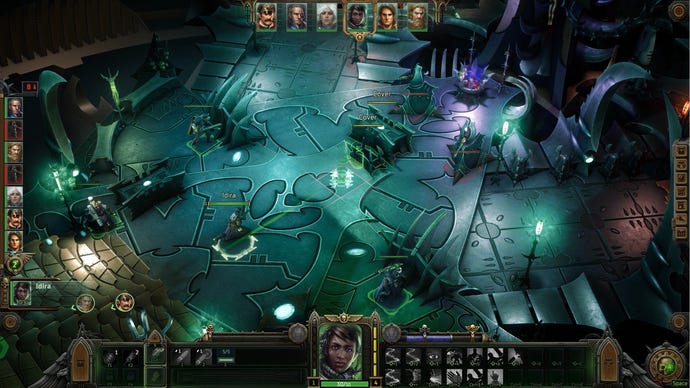
Image credit: Owlcat
And then there's Marazhai, a blade-dancing Dark Eldar. The Dark Eldar are among the least friendly of Warhammer 40K's seldom-friendly races. They like to torture people from 'lesser species' and feed on the resulting psychic energy. "They don't work with humans," Mishulin commented. "They consider humans animals. But in this particular case, it was either Marazhai dying or joining the retinue." You'll have a hard time persuading him to get chummy with xenophobic human party members, especially Space Marines and Sisters of Battle. But it's worth the trouble, because Marazhai is an absolute lawnmower in the fray. As an assassin, he can attack from oblique angles to inflict bonus damage, jump through enemies to reposition while slashing them, and score additional movement points whenever he lands a critical.
The quirks of Rogue Trader's characters add welcome spice to the game's solid, but familiar battle system, in which you spend movement and action points to move people into full or half-shield cover. There are lots of smaller variables and gambits to get your head around. Burst attacks have a chance of hitting allies and explodable objects, for example. Some AOE skills travel in a line, so try to lure those rampaging Orks into an orderly queue. Unlike larger guns, pistols can be used inside melee range - useful if you're firing a Burst, because you're almost guaranteed to hit the target. I didn't get much chance to see how varied Rogue Trader's enemy units are by comparison, but the Necrons from Mishulin's demo battle had some nifty dynamics. The bigger, bipedal ones can resurrect from death after a turn, and order other Necrons to focus fire. They're often escorted by flying Scarabs, which make puny skirmishers but can heal their allies and interrupt your turns.
While battles do seem formulaic in places - there's that familiar XCOM mop-up period, with the last survivor dug in somewhere denying you a clean finale - the game's Momentum gauge is a nice pace changer. You gain Momentum when you take turns and deal damage, and lose it when you receive damage or get knocked out. Fill the bar, and you can perform Heroic Acts, such as giving one character a whole additional turn. Empty it out, and you'll gain access to Desperate Measures that allow you turn the tide, though I wasn't told exactly how these differ from Heroic Acts.
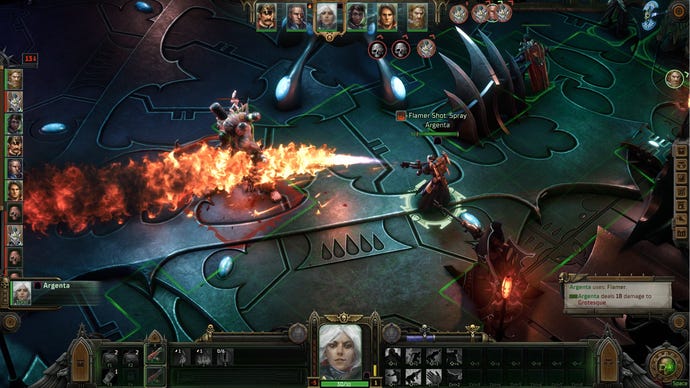
Image credit: Owlcat
I also didn't get to see much of the campaign beyond battle, but it sounds like there's plenty to do and explore. Grander locations include the Dark Eldar city Commorragh, which has never been glimpsed in a video game before. "We are working together with Games Workshop to make it as look as it should, to convey the Drukhari race, to show what they are into, and how it functions altogether," Mishulin said. "There's pretty tight cooperation between us." There are five main factions to befriend or alienate - the Drusians, the Explorators, the Kasballica Mission, the Fellowship of the Void and the Imperial Navy. As for planetary colonies, you can both found your own and reforge connections with Teodora's lost holdings, enriching yourself and accessing regional storylines, which may include dealing with problems your predecessor left unaddressed.
Befitting its title, Rogue Trader takes a more elaborate approach to inventory management. There are straightforward character inventories, but there's also a ship cargo screen that allows you to gift items to factions, bolstering your standing with them. All of this feeds into an overarching Profit Factor, which represents the potency of your imperial Warrant of Trade. The greater your Profit Factor, the greater your ability to, essentially, cheat by, say, forcing a faction to yield up a piece of precious armour without paying for it or affecting your reputation.
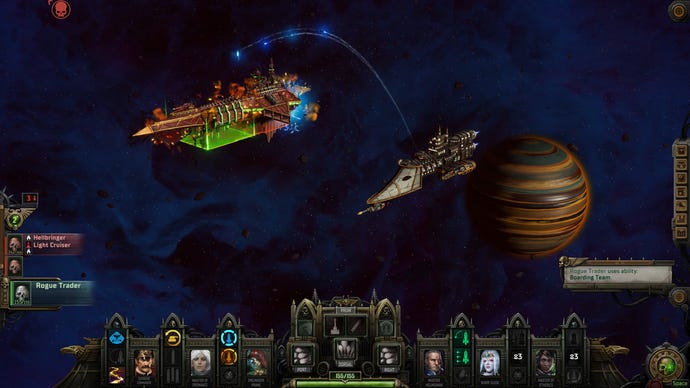
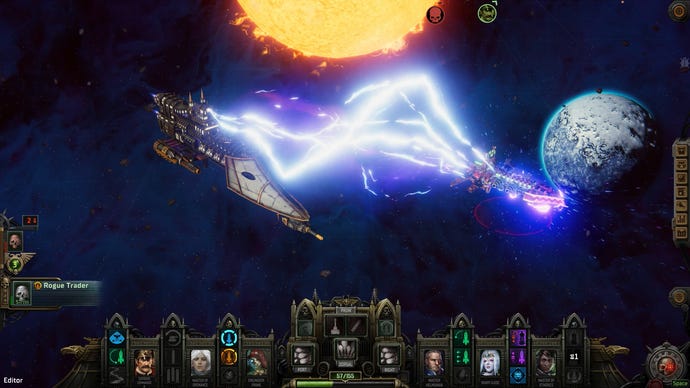
Image credit: Owlcat
Sadly for this lapsed Battlefleet Gothic player, Owlcat didn't share much during our demo about the game's spaceship - excuse me,
voidship combat, but the broad strokes seem promising. "It's also turn-based but the mechanics are completely different," Mishulin said. "It's closer to naval combat, moving into position, attacking enemies with broadsides. And also facing - there is a powerful enemy over here, but you have to point the nose of the ship in the direction of another enemy." Sounds a lot like Tindalos' Armada adaptations to me, which I've always wished were turn-based (I played them pretty much exclusively in tactical slow mo).
I'm not sure I can face another hundred hour RPG right now, but if I were going to crack open another character creator, Rogue Trader (which is currently without a release date) would appear high up the list. I might have missed out on 40K as a kid, but I've learned a thing or two about Games Workshop's horrendous universe in the course of playing umpteen video game adaptations, and Owlcat's latest seems to tick all the boxes. It's vast, bristling with things to customise, and powerfully grim. The major question ahead of review is whether its bigger narrative choices and consequences will add up into a compelling saga on par with the
best RPGs, or just another dragged-out spell in Warhammer's overflowing trenches.












































